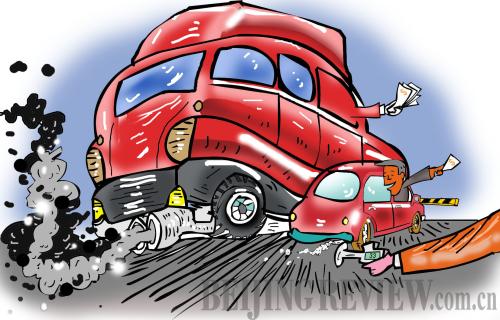|
 |
|
(LI SHIGONG) |
A new law on vehicle tax, to encourage the use of smaller engines to reduce pollution and oil dependence by collecting tax on the basis of engine capacity, is under consideration.
A draft of the law was passed on October 12, 2010, and the full text of the draft was available on the official website of the National People's Congress (NPC), China's top legislature, for public comment from October 28 to November 30, last year. During the month for collecting public opinions, the NPC received more than 97,000 comments. The draft law is expected to be finalized by spring of 2011 by the NPC Standing Committee.
The draft law seeks to cut taxes on fuel-efficient, clean-energy vehicles while imposing increased taxes on vehicles with larger engine capacity. Vehicles are divided into seven levels in the new law. Taxes on vehicles with an engine capacity smaller than 1.6 liters will be either reduced slightly or unchanged. Taxes on vehicles with an engine capacity between 1.6 and 2.5 liters will see a "moderate" increase while a "relatively large" increase will be imposed on vehicles with an engine capacity greater than 2.5 liters. All in all, the larger the engine capacity, the greater the tax.
The draft law is set to replace current tax regulations on vehicles that took effect in 2007.
It sparked heated debate among the public. Supporters think the move mainly aims to reform the current system of today's vehicle tax. By connecting the tax with engine capacity, it shows incentive measures for energy saving and emissions reduction and encourages development of vehicles with smaller engine capacity for users.
Opponents say they think it's not appropriate to raise the tax since it's not beneficial to the reform of the taxation system for the auto industry but a law aimed at raising prices. During the 12th Five-Year Plan, the Central Government should increase tax during the process of use while reducing tax at purchase, which would make people aware the more one drives the more tax will be paid, and the less one drives, the lesser tax will be due. Also, the vehicle tax could be changed into a fuel tax.
Saving energy and protecting the environment
Wang Bingang (www.ifeng.com): The principle should be to encourage the development of smaller vehicles with smaller engine capacity. As for luxurious vehicles with large engines, the government should put in place policies enabling compensation for damage they cause to the environment.
The draft law has very positive significance in energy saving and environmental protection. The greater the engine capacity is, the more tax should be levied. It's fair for all of society. Vehicles with smaller engines will have a lower vehicle tax while tax for a vehicle with larger engine will increase by a large extent, possibly up to 15 times as much as the previous amount.
Wang Bing (www.shihua.com.cn): Upgrading the current policy for tax enacted by the State Council in 2007 and making it law are in accordance with the principle of "levying tax by law," which is surely a huge progress.
Meanwhile, levying the tax on the basis of the engine capacity shows the desire to encourage energy saving and emissions reductions, and the principle of fairness. The major thrust of the new law is correct.
Ding Bo (Jiefang Daily): Engine capacity is the most effective standard of categorizing vehicles for the feasibility and convenience of tax collection. China is a large country with a large population and a huge number of vehicles. They have different prices. If we take the price as the basis for taxation, the government should carry out evaluation every year. Then, who is able to offer just and fair evaluation every year? Who is able to do that? How can we do that? If people are not satisfied with evaluations, who can they talk to? How can we afford the cost of evaluation? Those are just some of the problems brought about by the idea of levying it on the basis of value.
On the other hand, engine capacity, which is not directly related to the value of vehicles but has some positive correlation with value, makes the problem much simpler. It's convenient for designing a fixed tax rate, managing collection, and cutting costs on both sides of collection.
| 